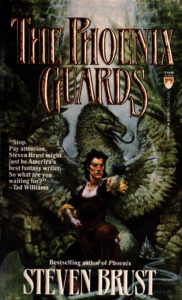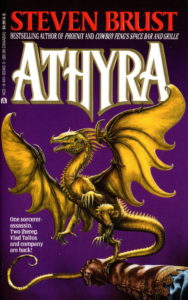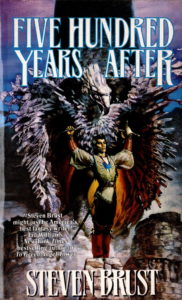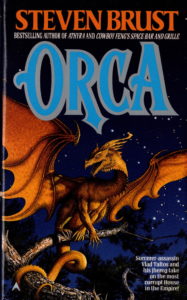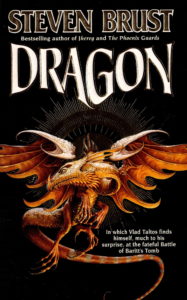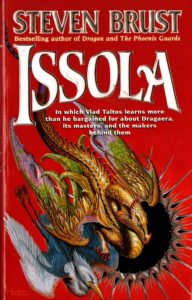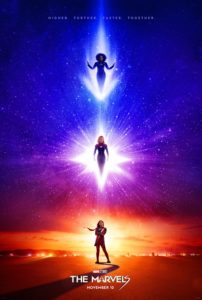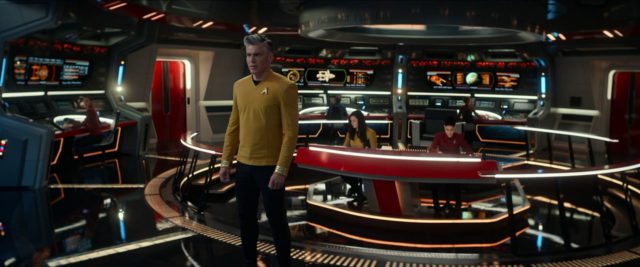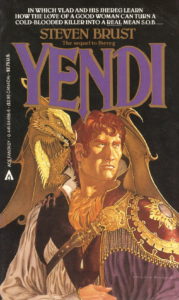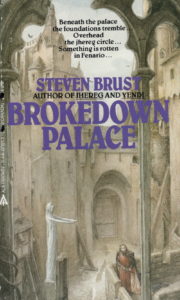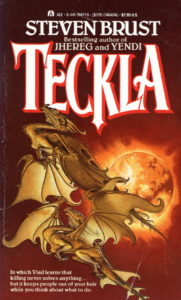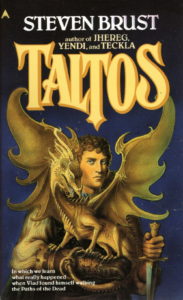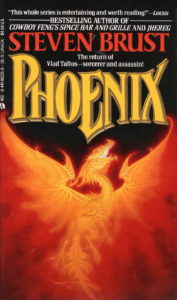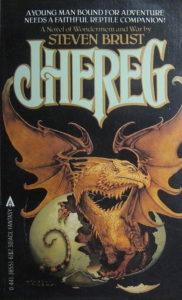A little over a year ago I reviewed the first arc of Steven Brust’s Vlad Taltos series. A year later, here I am to review the second arc. I don’t know that Brust thinks of this series in arcs like this, much less these specific sets of books as the arcs, but the last book of each of these two sets felt like pretty resounding “we’ve wrapped up this chunk of the story and now we’re moving on to something else” points to me. But, your mileage may vary.
As with last time, I’ll try to keep this spoiler-light. But as we get deeper into the series, it becomes difficult not to spoil some moments from earlier in the series. And in particular I’m going to spoil some of the end of the last arc because I can’t really discuss this arc without it.
The Phoenix Guards, MMPB, Tor, © 1991, ISBN 0-812 50689-8
This book is the first of a set of five called the Khaavren Romances, and while technically not part of the Vlad Taltos series, they are part of the overall Dragaera series, and they fit in pretty well when reading the books in publication order.
These five are named after their nominal protagonist, Khaavren, a Tiassa who in this book is a young man who sets off for Dragaera City to join the Emperor’s Phoenix Guards. They are written by a fictional Dragaeran novelist, Paarfi of Roundwood, who lives in the “present day” (i.e., is contemporary with Vlad Taltos), assembles his histories through diligent research, then writes them as dramatic adventures. But this story takes place a thousand years or more before the Vlad novels.
These books are also heavily influenced by Alexandre Dumas’ D’Artagnan Romances (or so I’m told, as I haven’t read those), and their titles are based on the ones in that series.
All that said, The Phoenix Guards is, along with Brokedown Palace, my least favorite book that I’ve read in the series, which was extra-frustrating given its length.
The book is more than twice as long as the individual Vlad novels, and it’s written in a very elliptical style, sometimes taking half a page or more to get from “let’s start this piece of dialogue” to “actually getting to the point of the dialogue”. And there’s little variation in this approach, with a heavy dose of courtesy and deference and particular turns of phrase. After a couple hundred pages of this I learned to actually skip that half a page to get to the point and it made the reading experience much more enjoyable. After talking to other people who read this book, it seems like you either like this sort of thing or you don’t, and I did not.
I found the story itself to be pretty thin: Khaavren meets three comrades on his journey and they all join the Guard. Then they end up setting out to capture a woman wanted for murder. Along the way they pick up a couple more companions, “have many adventures”, learn that one of their companions wants the wanted woman’s blood, get involved in a standoff that could lead to war, and then manage to clear everything up. This sounds like a lot, but most of it is “have many adventures”. It’s an episodic novel which chugs along at a fairly even pace, albeit for far too long for my tastes.
The best part the interplay between Khaavren and his friends. But Khaavren is the only one who’s really vividly drawn; his three friends are more archetypes than fully rounded characters. The fourth of them, Pel, joins up in a manner that made me think for the whole rest of the book that he was actually aligned with the villains and was going to betray the rest at some point.
There are some interesting parallels between this one and Brokedown Palace in that they both involve encounters between the Dragaeran Empire and Easterners, but since they’re my two least favorite books in the series to date, I’m not motivated to go back and see if there’s more meaning to be found in them.
Many people love The Phoenix Guards, and my impression is that it was a major factor in putting Brust on the map as one of the great contemporary fantasy authors (I remember seeing it all over the place in the mid-90s when going to conventions), so feel free to take my opinion with a grain of salt.
Athyra, MMPB, Ace, © 1993, ISBN 0-441-03342-3
When we left Vlad at the end of Phoenix, he had broken up with his wife, left all his property to her and to his friends, and was on the run from his former House, the Jhereg, who were seeking revenge against him. After two years of wandering – with only his Jhereg familiar Loiosh and Loiosh’s mate Rocza – he rolls up at the very rural village of Smallcliff, where he meets Savn, a young man apprenticed to the local physicker. Vlad happens to show up at the same time as the death of a former servant of the local Baron.
In contrast to the earlier books, this one is narrated by Savn, giving us a very different perspective on Vlad. It’s also a small and intimate story in which Savn has a bit of hero worship, learns some sorcery and witchcraft from Vlad, and helps him in the job that Vlad decides he has to do in the area. The second half of the book has some of the most brutal scenes of the series to date, and many of the characters are put through the wringer before we reach the end.
It’s a pretty good book, but its grim tone and the replacement of Vlad’s sardonic voice with Savn’s inexperienced and earnest one makes it less enjoyable overall. I see what Brust was going for here, and maybe having Vlad narrate this particular story wouldn’t have given it the punch it has. But hoo boy, it is a rough trip at times.
This is also one of those books where I wonder about naming the books after the Great Houses, as the connection to the house of Athyra seems pretty tenuous. Based on this description of the house, and the sometimes-stated principle that Vlad adopts characteristics of the house in the book of that title, I can see it, but it’s the sort of thing that would be more effective if made more clear in the novel’s text.
Five Hundred Years After, MMPB, Tor, © 1994, ISBN 0-812-51522-6
The sequel to The Phoenix Guards, this book takes us back to the adventures of Khaavren and company, many years (I’ll let you guess how many) after their previous ones. Khaavren is now the head of the guards, while his friends have their own careers.
Khaavren uncovers a conspiracy to sow discord in the empire, which is already in shaky condition thanks to the incompetence of the current Emperor. While there is also an element of “they had many adventures” to this story, there’s also a growing sense of dread as the shadowy plan is slowly executed, which builds towards insurrection and then one of the seminal events of the modern Empire. As such, it feels like a much more meaningful and relevant book than The Phoenix Guards, that book now seeming to me like a light preface to this one. The banter among the friends is less present and much missed (two of those friends don’t feature much in the book), but the plot more than makes up for it. Also, thankfully, the elliptical writing style of the first book is greatly toned down. (It still feels like it could have been a hundred or more pages shorter.)
All that said, this book is important reading for what comes later in the series, as it provides important historical context, and even insight into one of the major supporting characters (as Dragaerans are very long-lived).
Orca, MMPB, Ace, © 1996, ISBN 0-441-00196-3
We return to Vlad after another year or so where he’s continued to wander around, this time not just to avoid the Jhereg, but also to discharge a deep obligation he owes someone. He finds a person who can help him with that, but in order to do so he has to solve the riddle of why a local businessman was killed. This gets him wrapped up in a plot by the Orca, who are a sort of combination of the local mob and aggregation of street gangs. Vlad recruits his friend Kiera the Thief to help him out, and the narration alternates between the two of them (with a few notable interludes). They find the plot is much farther-reaching than they’d dreamed, and Vlad has to do some clever sleuthing and fast thinking to resolve things.
It’s a pretty enjoyable adventure, especially if you enjoy the sleuthing, which is sort of the Dragaeran equivalent of hard-boiled detective investigations. But there are a couple of significant revelations at the end of the book. One of them is perhaps not so surprising (and arguably a bit cliché), but the other shines a very different light on the relationship between Vlad and one of his friends, which seems likely to have some real influence on how things play out in the future.
Dragon, MMPB, Tor, © 1998, ISBN 0-812-58916-5
Dragon is another flashback novel, this time to not long after the events of Taltos. Vlad’s ally Morrolan – who by the end of this novel will invite Vlad to head up his castle’s security, thus establishing the status quo of Jhereg – hires Vlad to guard a cache of weapons left behind by a recently deceased Dragon lord. Another Dragon lord steals one of these weapons, leading Morrolan, who is also – you guessed it – a Dragon – to declare war. Vlad enlists (!) in Morrolan’s army, largely because the other lord has given Vlad a personal reason to want to be involved. Morrolan hires the formidable Sethra Lavode – a long-lived and maybe undead sorcerer who’s cast a long shadow over the series but is about to become a lot more significant – as his general. Vlad spends most of the war (1) hating warfare, and (2) figuring out how to get close to the other lord.
Dragons are a major house in the series, partly because Morrolan is one, and partly because they’re going to be the next house to rule the Empire once the Phoenix dynasty ends. They’re almost kind of comical to this point (an evaluation which would no doubt get me run through if I ever met one of them), as hard-headed, combat-ready fighters who are quick to offense. Dragon gives us a lot of exposure to and some insight into Dragons, but doesn’t move the needle a lot regarding their character.
This volume also establishes some important pieces of Vlad’s backstory, and the return of Vlad’s narrative voice is very welcome, even if some chunks of the book seem like “a lot of running around”. But this is merely the calm before…
Issola, MMPB, Tor, © 2001, ISBN 0-812-58917-3
…the storm, which arrives when the Jenoine, the near-god-like beings who predates human presence on the planet, capture Morrolan and Aliera. Morrolan’s aide Lady Teldra (the Issola of the title) tracks Vlad down and recruits him to help, taking him to Sethra Lavode, who manages to transport him to where the captives are being held.
And then things get really interesting.
There’s an undercurrent of the Dragaeran novels in which they could be seen as either science fiction or fantasy. While there’s really no science fictional explanation for the kind of magic we see in the books (other than Clarke’s Third Law, though the way the magic is depicted doesn’t suggest that’s in play), this book is the strongest case for science fiction that we’ve yet seen, as it involves multiple planets (probably), and the origins of Easterner and Dragaeran humans (probably exactly what you’re thinking, if you’ve read the series this far). On the other hand, it also concerns gods, primordial goo, souls, and, well, magic. Vlad is playing maybe the highest-stakes game of his life, supported by some of the most powerful beings he’s ever known, and it’s an incredibly tense story, albeit with an unusual amount of exposition in it. (Though she’s maybe the greatest general in Dragaeran history, whenever Sethra shows up we can expect a bunch of exposition.)
Plus it has some of the best Vlad/Loiosh interplay of the series. Lady Teldra is a nice, even-tempered counterbalance to Vlad’s ball of energy and anxiety, and one of the few people who gives Vlad straight answers when she can. (On that note, it’s also nice to see Vlad pop off at Morrolan and Sethra in this book, something every smarter-than-thou Dragaeran deserves to be on the receiving end of once in a while.) This is easily the best book of the arc, and one of the best of the series. Kudos to Brust for making Lady Teldra such a strong and engaging character in a single book, when she’s competing for space with Vlad and three of the other major supporting characters.
Overall, this arc feels like Brust was assembling key story pieces on top of the basic set-up from the first arc, leading to a big payoff in Issola, but also setting things up so that we can really go almost anywhere after this, presumably with even more serious repercussions.
But first I know we’re next going back to the last three of the Khaavren Romances, which look like they’ll fill in even more of Dragaera’s history. So it will be another 1,200+ pages before I find out where Vlad goes from here.

